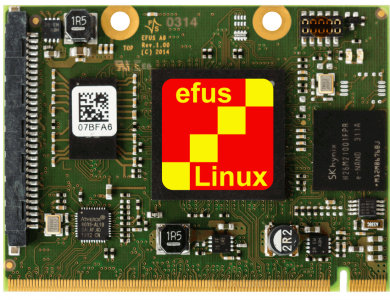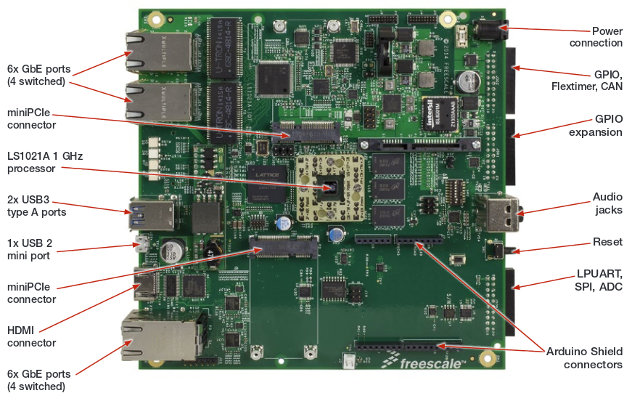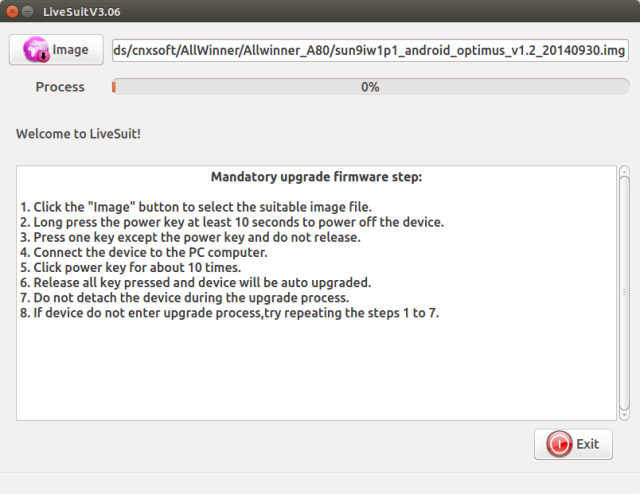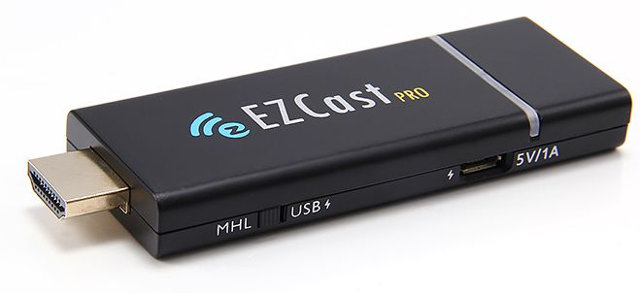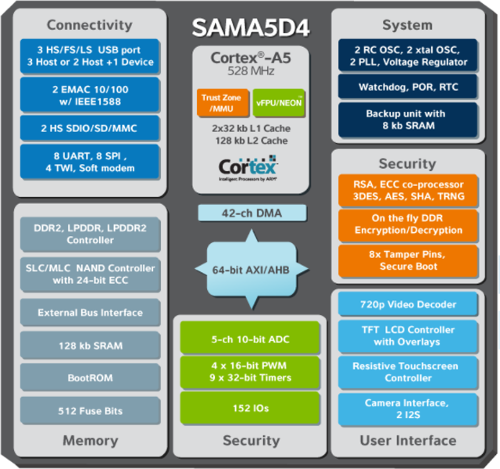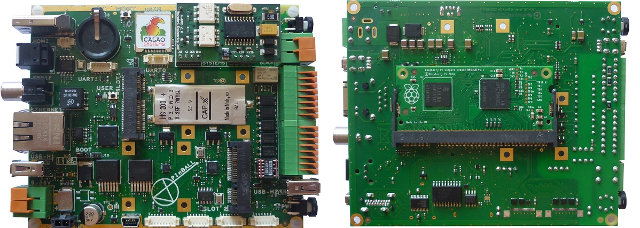Linus Torvalds announced the release of Linux Kernel 3.17 on Sunday: So the past week was fairly calm, and so I have no qualms about releasing 3.17 on the normal schedule (as opposed to the optimistic “maybe I can release it one week early” schedule that was not to be). However, I now have travel coming up – something I hoped to avoid when I was hoping for releasing early. Which means that while 3.17 is out, I’m not going to be merging stuff very actively next week, and the week after that is LinuxCon EU… What that means is that depending on how you want to see it, the 3.18 merge window will either be three weeks, or alternatively just have a rather slow start. I don’t mind getting pull requests starting now (in fact, I have a couple already pending in my inbox), but I likely won’t start processing […]
Cortus Introduces APS23 and APS25 32-Bit Cores for Micro-controllers
ARM and MIPS are not the only games in town with it comes to 32-bit cores for micro-controllers. I’ve already written about Beyond Semiconductor, and mentioned Andes used in some Wi-Fi SoC, and today I’ve come across another IP company called Cortus. which just introduced APS23 and APS25 cores based on their latest Cortus V2 instruction set. which offers a smaller code footprint compared to there V1 ISA. APS23 can achieve 1.44 Coremarks/MHz, 2.83 DMIPS/MHz, and can run up to 200 MHz when manufactured with 90nm process, whereas APS25 is a bit more powerful with 2.09 Coremarks/MHz, 2.36 DMIPS/MHz, and can run up to 344 MHz. Minimal power consumption is 11.6 and 19.3 uW/Mhz for APS23 and APS25 respectively. Key features of both cores include: APS23 APS25 Excellent Code Density 3 stage pipeline 5-7 Stage Pipeline Sequential Multiplier High Performance Integer Multiply Optional Parallel Multiplier (Gives 2.62 Coremakes/MHz) Integer Divider Full Peripheral Set Dual […]
F&S Elektronik Systeme Introduces eFus A9 Industrial Computer Modules Powered by Freescale i.MX6 SoC
F&S Elektronik Systeme, a German embedded systems company, has announced their efus A9 Computers-on-Module (CoM) based on Freescale i.MX6, are now in mass production. The CPU comes in two variants A9V2 for i.MX6 Solo, and A9V3 with i.MX6 DualLite, both of which are certified for automotive and industrial applications, and support commercial, extended, and industrial temperature ranges. eFuse A9 computer-on-module specifications: SoC – CPU Freescale i.MX6 Solo (eFus A9V2) or DualLite (eFus A9V3) @ up to 1.2 GHz + Vivante 2D and 3D GPUs System Memory – 512MB (Up to 1GB RAM) Storage – 256 MB NAND flash (Up to 1GB), 2 GB eMMC (eFus A9V3 only. up to 32GB), optional SPI NOR, optional I2C EEPROM Display I/F – 18-bit RGB, 2x 24-bit LVDS, and DVI Other interfaces available via 230 pins MXM-2 edge connector: 2x SD card I/F 1x Gigabit Ethernet 1x USB Host, 1x USB Device 2x CAN […]
Freescale LS1021A-IOT IoT Gateway Reference Design Powered by QorIQ LS1021A Dual ARM Cortex A7 SoC
Freescale has just launched a an IoT gateway reference design powered by their QorIQ LS1021A communication processors running Linux/OpenWRT, designed in partnership with TechNexion, and targeting various IoT applications such as building/home management, smart cities, networked industrial services, etc… Beside the dual core Cortex A7 QoirIQ processor, the board features six Gigabit Ethernet ports, two USB 3.0 ports, a SATA 3 port, two mini PCIe connector, an LVDS interface, HDMI output, Arduino UNO compatible headers, and various others expansions headers. LS1021A-IOT IoT gateway Specifications: SoC – Freescale QorIQ LS1021A dual core Cortex A7 communication processor @ 1 GHz (5,000 coremarks) MCU – Freescale Kinetis K20 Cortex M micro-controller System Memory – 1 GB DDR3L Storage – 1 Gb QSPI NOR Flash, SDHC slot (up to 32 GB) populated with a 4GB SD card, 1x mSATA 3 slot Connectivity – 6x Gigabit ports via SGMII (Serial Gigabit Media Independent Interface) and […]
How to Upgrade Allwinner A80 OptimusBoard Firmware
After informing Allwinner I had some rather slow write speed (3MB/s) to the NTFS partition of my USB drive on my A80 OptimusBoard, they kindly provided a new compressed Android firmware image (sun9iw1p1_android_optimus_v1.2_20140930.img.7z) with some NTFS optimizations that can be downloaded from baidu (password: x2tz), mega.co.nz or simos.info (please only use this link, if the other two do not work as it’s a private website and monthly bandwidth may be limited). I vaguely remember tools like LiveSuit (Linux) or PhoenixSuite (Windows), and I ended up on sunxi-linux Livesuit wiki as I’m running Ubuntu 14.04 on my PC, but you should be able to flash the firmware with PhoenixSuite if you run Windows. The instructions below can also be used for other Allwinner based devices. First you need to install LiveSuit, and build Allwinner USB drivers as follows:
|
1 2 3 4 5 6 7 8 |
sudo apt-get install dkms git build-essential git clone https://github.com/linux-sunxi/sunxi-livesuite.git cd sunxi-livesuite/awusb make sudo cp awusb.ko /lib/modules/`uname -r`/kernel/ sudo depmod -a sudo modprobe awusb cd.. |
In order to use LiveSuit as a normal user, you also have […]
Tronsmart T2000 EZCast Pro Dongle Supports MHL, Split Screen, Improves Wi-Fi Performance
EZCast dongles, tiny HDMI streaming Wi-Fi stick with support for Airplay, Miracast, DLNA, and their own proprietary EZCast protocol first appeared about a year ago. I’ve reviewed a few including Tronsmart T1000 and MeLeCast S1, and found them to work relatively well, with some caveats, in Android. There’s now a new EZCast Pro wireless adapters that adds features such for four split screens display, conference control via web browser, and content broadcast to multiple screens, as well as improved wireless performance thanks to 2T2R Wi-Fi. Tronsmart T2000 is the first device I’ve heard of, that’s EZCast Pro capable. Tronsmart T2000 hardware specifications: SoC – Action Semi AM8251 @ 500MHz (MIPS) System memory – 256 MB DDR3 RAM Storage – 128 MB NAND Flash Video output – HDMI 1.2 / MHL 2.0 Wi-Fi – Single band 802.11 a/b/g/n Wi-Fi 2T2R up to 300 Mbps Standards – Miracast, Airplay, DLNA, and EZCast […]
Atmel Introduces SAMA5D4 Embedded MPUs With 720p Video Decoder And TrustZone Support
Atmel has expanded its SAMA5 Cortex A5 embedded processor family with SAMA5D4 series adding an optional video processing unit capable of decoding H264, VP8 and MPEG4 at 720p / 30fps, as well as support for ARM NEON and TrustZone technology. There are also some other changes with regards to connectivity: no Gigabit Ethernet, more UART interfaces, less SPI interfaces, etc… Key features listed of Atmel SAMA5D4 series:: ARM Cortex-A5 core up to 528MHz (840DMIPS) with NEON & TrustZone support, 2x 32KB L1 cache, and 128KB L2 cache. Optional 720p hardware video decoder supporting H264/263, VP8, JPEG, and MPEG4. Graphic LCD TFT controller with overlays for image composition, resistive touchscreen controller. CMOS image sensor interface. Three high-speed USB ports (configurable as three hosts or two hosts and one device port). Dual EMAC 10/100 with IEEE1588 support (Precision Time Protocol). Other I/Os – 8x UART, 8x SPI, 4x TWI, 2 HS SDIO/SD/MMC, […]
CALAO Systems Introduces PInBALL Industrial Board Based on Raspberry Pi Compute Module
CALAO Systems has just launched an industrial single board computer (SBC) for professional Raspberry Pi developers called PiNBALL or, if you prefer, PAC-1210-S200-B2835-EXX…. The board is powered by the Raspberry Pi Compute Module, features interfaces such as two mini PCIe slots (for USB, I2C, GPIOs,…), fast Ethernet, HDMI, opto-isolated inputs and outputs, etc., +6 to +36V power input, and can operate in -20°C to +70°C temperature range. PInBALL industrial SBC specifications (Items marker with ‘*’ are optional, and depend on model): SoC / Memory / Storage – Via Raspberry Pi Compute Module – Broadcom BCM2835, 512MB RAM, 4GB eMMC Flash. Other Storage – 1x 2Kb I²C EEPROM with EUI-48 MAC Address & 128 bit Serial Number (AT24MAC402). Video Output – 1x HDMI Out, 1x CVBS Out (BCM2835) Audio Output – 1x HDMI, 2x S/PDIF Out / Optical & RCA (WM8804), Connectivity – 1x Fast Ethernet (LAN9514), 1x Micro-SIM Socket USB […]




